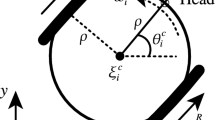Abstract
This paper proposes a distributed receding horizon control approach for the formation and tracking problems of multi-agent systems with collision and obstacle avoidance. We design an algorithm to enlarge the terminal position sets of the agents in sequential order. Since the proposed approach is based on the synchronous framework, each agent must utilize the assumed predictive information of its neighbors. A compatibility constraint is reformulated for the local optimization, which restricts the deviation between the assumed and true predictive states. To ensure the safety of each agent, the deviation-dependent collision-avoidance constraint and the obstacle-avoidance constraint are designed. Moreover, the closed-loop multi-agent systems are guaranteed to be exponentially stable, and the control performance is improved compared with the previous approaches. A simulation example is provided to illustrate the advantages of the proposed approach.









Similar content being viewed by others
References
E. Camponogara, D. Jia, B.H. Krogh, S. Talukdar, Distributed model predictive control. IEEE Control Syst. Mag. 22(1), 44–52 (2002)
P.D. Christofides, R. Scattolini, D.M. de la Peña, J. Liu, Distributed model predictive control: a tutorial review and future research directions. Comput. Chem. Eng. 51(14), 21–41 (2013)
L. Dai, Q. Cao, Y. Xia, Y. Gao, Distributed MPC for formation of multi-agent systems with collision avoidance and obstacle avoidance. J. Frankl. Inst. 354(4), 2068–2085 (2017)
L. Dai, Y. Xia, Y. Gao, M. Cannon, Distributed stochastic MPC of linear systems with additive uncertainty and coupled probabilistic constraints. IEEE Trans. Autom. Control 62(7), 3474–3481 (2017)
B. Ding, L. Xie, W. Cai, Distributed model predictive control for constrained linear systems. Int. J. Robust Nonlinear Control 20(11), 1285–1298 (2010)
W.B. Dunbar, D.S. Caveney, Distributed receding horizon control of vehicle platoons: stability and string stability. IEEE Trans. Autom. Control 57(3), 620–633 (2012)
W.B. Dunbar, R.M. Murray, Distributed receding horizon control for multi-vehicle formation stabilization. Automatica 42(4), 549–558 (2006)
G. Franzè, A. Casavola, D. Famularo, W. Lucia, Distributed receding horizon control of constrained networked leader-follower formations subject to packet dropouts. IEEE Trans. Control Syst. Technol. 26(5), 1798–1809 (2017)
J. Gao, Y. Xu, R. Lu, Output regulation of linear singular multi-agent systems. Circuits Syst. Signal Process 36(3), 1–16 (2016)
M.V. Kothare, V. Balakrishnan, M. Morari, Robust constrained model predictive control using linear matrix inequalities. Automatica 32(10), 1361–1379 (1996)
H. Li, Y. Shi, Event-triggered robust model predictive control of continuous-time nonlinear systems. Automatica 50(5), 1507–1513 (2014)
H. Li, Y. Shi, W. Yan, On neighbour information utilization in distributed receding horizon control for consensus-seeking. IEEE Trans. Cybern. 46(9), 2019–2027 (2016)
T. Li, F. Wu, J.F. Zhang, Multi-agent consensus with relative-state-dependent measurement noises. IEEE Trans. Autom. Control 59(9), 2463–2468 (2014)
C. Liu, J. Gao, H. Li, D. Xu, Aperiodic robust model predictive control for constrained continuous-time nonlinear systems: an event-triggered approach. IEEE Trans. Cybern. 48(5), 1397–1405 (2018)
C. Liu, H. Li, J. Gao, D. Xu, Robust self-triggered min–max model predictive control for discrete-time nonlinear systems. Automatica 48, 333–339 (2018)
H. Pei, S. Chen, Q. Lai, A local flocking algorithm of multi-agent dynamic systems. Int. J. Control 88(11), 2242–2249 (2015)
A. Richards, J.P. How, Robust distributed model predictive control. Int. J. Control 80(9), 1517–1531 (2007)
C. Wang, C.J. Ong, Distributed model predictive control of dynamically decoupled systems with coupled cost. Automatica 46(12), 2053–2058 (2010)
A. Wächter, L.T. Biegler, On the implementation of an interior-point filter line-search algorithm for large-scale nonlinear programming. Math. Program. 106(1), 25–57 (2006)
P. Wang, B. Ding, A synthesis approach of distributed model predictive control for multi-agent system with collision avoidance. Int. J. Control 87(1), 52–63 (2014)
M. Zhao, B. Ding, Distributed model predictive control for constrained nonlinear systems with decoupled local dynamics. ISA Trans. 55(11), 1–12 (2015)
Z. Zhong, L. Sun, J. Wang, P. Lv, H. Zheng, Consensus for first- and second-order discrete-time multi-agent systems with delays based on model predictive control schemes. Circuits Syst. Signal Process 34(1), 127–152 (2017)
L. Zhou, S. Li, Distributed model predictive control for consensus of sampled-data multi-agent systems with double-integrator dynamics. IET Control Theory Appl. 9(12), 1774–1780 (2015)
B. Zhu, A.H.B. Zaini, L. Xie, Distributed guidance for interception by using multiple rotary-wing unmanned aerial vehicles. IEEE Trans. Control Syst. Technol. 64(7), 5648–5656 (2017)
Acknowledgements
This work is supported by National Key R&D Program of China (No. 2017YFA0700300), by Natural Science Foundation of China (No. 61573269), by NSFC-Zhejiang Joint Fund for the Integration of Industrialization and Informatization (No. U1509209).
Author information
Authors and Affiliations
Corresponding author
Rights and permissions
About this article
Cite this article
Yang, Y., Ding, B. Tracking and Formation of Multi-agent Systems with Collision and Obstacle Avoidance Based on Distributed RHC. Circuits Syst Signal Process 38, 2951–2970 (2019). https://doi.org/10.1007/s00034-018-1003-5
Received:
Revised:
Accepted:
Published:
Issue Date:
DOI: https://doi.org/10.1007/s00034-018-1003-5




